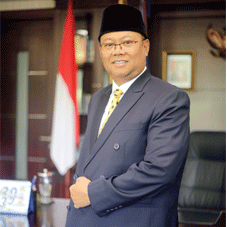
Prof. Ojat Darojat
Rector
Online learning has shown significant growth over the last decade, as the internet became popular and provided people with the opportunity to gain new skills. While brick-and-mortar schools won't be fading away anytime soon, the prevalence of online options is increasing in order to help support the pursuit of education and to fit the needs of today's tech-centric society. There's no need to stress about the logistics of being physically present in a classroom or the difficulty of someone else's planned schedule when there are so many different courses available at one's fingertips. Teachers with state certification are able to work with students one-on-one and individually from the comfort and convenience of their homes or favourite coffee shops.
A renowned university that is spearheading the A renowned university that is spearheading the online learning trend is Universitas Terbuka (UT). UT has been providing quality distance education for almost four decades since its establishment in 1984.
In this interview with CEO Insights Asia Magazine, Prof. Ojat Darojat, Rector of UT shares his thoughts about online education, how to smoothly transition to the digital world, and deliver high-quality education.
How do you apply your skills and experience to revolutionize the education market?
I hope that with the position I presently hold, I will be able to do more to help UT grow and improve. I would like to see UT become the leader in Asia for its open and distance education (ODE) with global standards that can outreach all people around the globe, including those who live in the most isolated or remote locations where access to higher education is so difficult. As a result, the term 'openness' can be applied broadly to any people, places, ideas, or thoughts, as well as the application of new methods in the implementation of education. Furthermore, in order to answer the needs of the education market, UT has been officially appointed to lead the consortium for Indonesia Cyber Education Institute (ICE-I), i.e. an online learning marketplace in Indonesia equipped with galleries for online courses. ICE-I provides hundreds of courses that can be taken and credited within the Indonesian higher education ecosystem (national e-Learning registry) and linked to the job market using blockchain.
How would you define Universitas Terbuka Indonesia as an organization and its position in the education sector?
UT has been striving to prove itself as a university that employs quality distance education for almost four decades since its establishment in 1984. In 2018, the Ministry of Research and Technology and Higher Education announced UT as the national benchmark of distance higher education institutions offering online learning programs. Besides being mandated to be a Cyber University and one of the founders of the ICE-I, UT has also been positioned as a leader in Indonesia in promoting quality online learning delivery in the country. In October 2022, UT has been officially transformed into a state university with legal entities (PTNBH) based on the Indonesian Government Regulation signed by the President of the Republic of Indonesia. This national recognition has brought UT to have the autonomy to manage its academic and financial matters. UT has been regarded as strategic a key player in Asia in advocating open and distance learning neighbor hoods.
Could you tell us about the distance education programs that your organization offers helping to produce highly competitive graduates?
After implementing the ODE for 38 years and producing up to two million alumni, UT has proven to be able to reach groups of people who are unreachable by the face-to-face higher education institutions which also offer 'limited' access in age and length of study. The system of ODE, especially in implementing online learning, is recognized by the government as a system of learning that may increase the gross participation rate of higher education.
Tell us about the most effective methodology and technologies used in your organization to ensure better learning experiences for your students.
UT continues to develop and implement technology-based, or especially web-based facilities and infrastructures to facilitate the students' learning process. For the last two decades, UT has implemented a web-based single sign-on registration system. This application enables UT to offer integrated online services, such as online student admission, course registration, registration of final assignments, and other academic administration processes.
Furthermore, UT is currently developing a digital learning ecosystem (DLE) with the purpose of providing great benefits to social networks and a virtual environment with easy access to information digital for all internal users as well as UT stakeholders. Another important issue in optimizing students' support services is quality assurance in all aspects.
UT continues to develop and implement technology-based, or especially web-based facilities and infrastructures to facilitate the students' learning process
In light of your strong experience within the industry, what advice would you give to the upcoming educationists?
It is important to put the strategic priority of open learning for every university. In addition, schools and universities have to conduct students' and teachers' training/knowledge upgrading on online learning, both capacity building, and help-desk e-Learning. There is a high demand for enhancing internet literacy skills. They have to enhance the new literacy, are data literacy, technology literacy, human literacy, and lifelong learning) and also 6C's characters, they are collaboration, critical thinking, creativity, communication, computational thinking, and compassion. Educational institutions must create a more agile and flexible system for online pedagogy and develop low-tech innovations to give learning opportunities to students who are disadvantaged.
Prof. Ojat Darojat, Rector, Universitas Terbuka
Prof. Ojat works as a faculty member in ODE for more than 30 years and pursuing a doctoral de-gree in Quality Assurance from Simon Fraser Uni-versity, Canada, have brought me to the position as the Rector of Universitas Terbuka as well as the President of the Asian Association of Open Uni-versities (AAOU) 2020-2022 and 2023-2025. These positions have enabled me to optimally promote Open, Distance, and Flexible Learning (ODFL) regionally in Asia and globally.



.png)